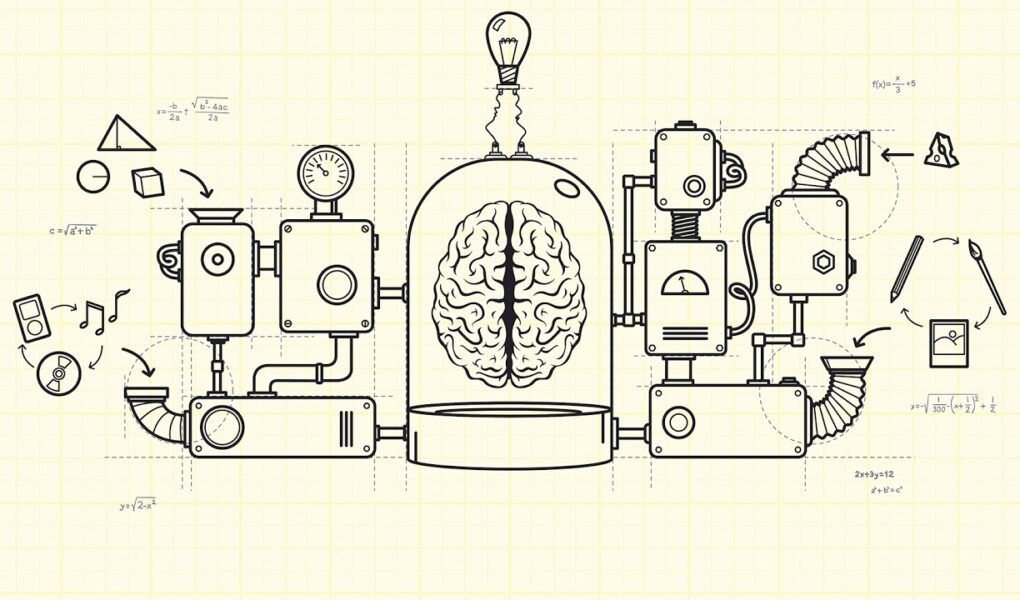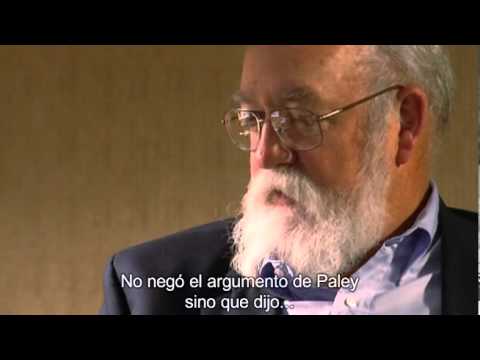Big Think
Memes 101 | How Cultural Evolution Works
Watch the newest video from Big Think: https://bigth.ink/NewVideo
Join Big Think Edge for exclusive videos: https://bigth.ink/Edge
———————————————————————————-
We are what we are because of genes; we are who we are because of memes. Philosopher Daniel Dennett muses on an idea put forward by Richard Dawkins in 1976.Ever wondered where the word ‘meme’ comes from? Philosopher and cognitive scientist Daniel Dennett explains the term, coined by Richard Dawkins in his 1976 book The Selfish Gene, and its effects on our lives and history. How did we, as a species, become what we are – or more relevantly who we are? Natural selection and genetic evolution have made our physical bodies, but we are so much more than a collection of cells. We are also a conscious community, with language, music, cooking, art, poetry, dance, rituals, and humor. Dennett explains how these behaviors are the product of our cultural evolution. Memes are cultural replicators that spread like viruses, and only the most advantageous – or “the fittest” – of them survive. Daniel Dennett’s most recent book is From Bacteria to Bach and Back: The Evolution of Minds.
———————————————————————————-
DANIEL DENNETT:
Daniel C. Dennett is the author of Intuition Pumps and Other Tools for Thinking, Breaking the Spell, Freedom Evolves, and Darwin’s Dangerous Idea and is University Professor and Austin B. Fletcher Professor of Philosophy, and Co-Director of the Center for Cognitive Studies at Tufts University. He lives with his wife in North Andover, Massachusetts, and has a daughter, a son, and a grandson. He was born in Boston in 1942, the son of a historian by the same name, and received his B.A. in philosophy from Harvard in 1963. He then went to Oxford to work with Gilbert Ryle, under whose supervision he completed the D.Phil. in philosophy in 1965. He taught at U.C. Irvine from 1965 to 1971, when he moved to Tufts, where he has taught ever since, aside from periods visiting at Harvard, Pittsburgh, Oxford, and the École Normale Supérieure in Paris.
His first book, Content and Consciousness, appeared in 1969, followed by Brainstorms (1978), Elbow Room (1984), The Intentional Stance (1987), Consciousness Explained (1991), Darwin’s Dangerous Idea (1995), Kinds of Minds (1996), and Brainchildren: A Collection of Essays 1984-1996. Sweet Dreams: Philosophical Obstacles to a Science of Consciousness, was published in 2005. He co-edited The Mind’s I with Douglas Hofstadter in 1981 and he is the author of over three hundred scholarly articles on various aspects on the mind, published in journals ranging from Artificial Intelligence and Behavioral and Brain Sciences to Poetics Today and the Journal of Aesthetics and Art Criticism.
Dennett gave the John Locke Lectures at Oxford in 1983, the Gavin David Young Lectures at Adelaide, Australia, in 1985, and the Tanner Lecture at Michigan in 1986, among many others. He has received two Guggenheim Fellowships, a Fulbright Fellowship, and a Fellowship at the Center for Advanced Studies in Behavioral Science. He was elected to the American Academy of Arts and Sciences in 1987.
He was the Co-founder (in 1985) and Co-director of the Curricular Software Studio at Tufts, and has helped to design museum exhibits on computers for the Smithsonian Institution, the Museum of Science in Boston, and the Computer Museum in Boston.
———————————————————————————-
TRANSCRIPT:
Daniel Dennett: Richard Dawkins coined the term meme in his 1976 book The Selfish Gene. And what he proposed was that human culture was composed, at least in part, of elements, units that were like genes in that they were copied and copied and copied and copied and copied. And it was the differential copying, the differential replication of these items, these memes that accounted for the excellent design of so much in human culture. And this is a very repugnant and offensive idea to many people, especially in the humanities. They wanted to hang onto the idea of the God like genius creator who out of sheer conscious brilliant comprehension makes all these wonderful things, whether they’re poems or bridges or whatever. He was saying in effect well yes people do make amazing things, but if you look at the projects in detail you see that they couldn’t do that if they hadn’t filled their head with all these informational things, which are like genes, which are also information. But they’re not fast down through the germ line. They’re not passed down through the sperm and the egg. You don’t get them with your genes. You get them from the ambient culture, from your parents, from your peers, from the society in which you’re raised. It requires perception.
Read the full transcript at https://bigthink.com/videos/daniel-dennett-memes-101
Source




Dennett is wrong about inflection not carrying information which would then not make all the uttrances of dog tokens of the same type. Still, I get his point, but it is still wrong (as "dog" can be used for a animal, a person, an emotion, nothing at all, etc. depending on usage and inflection). This then rejects his claim that we are "stupid, walking, breathing vectors," but he might be right that they functioned this way at first, they are now manipulated apart from their mere utility.
is the "scientific method" a meme? and when it was "invented", was it actually "established" for the first time or was actually "copied into our human culture for the first time" …. the second options obviously suggests that it has always been their. It seems logical to me that the existence of the "analytical power" of our brains which is obviously part of our culture can not be explained by a simple copy of "meme". there has to be a more consistent and "general way" method for growing human cultures. last statement does not seem to be a good conclusion "piece of engineering and nobody invented it" because there has to be a first copy 🙂
thanks dr. Dennett, very insightful video!
He sounds a little bit like Dr. Steve Brule.
He sounds a little bit like Dr. Steve Brule.
He sounds a little bit like Dr. Steve Brule.
Richard Dawkins meme god!
So meme is typically how human function and society works in a whole
The wheel was a dank meme
I'm writing a paper about memes for my sociology course and the research as been super interesting I've been having a good time
Good explanation.
One of the best explanations I heard on YouTube and of course I searched myself. Thanks for nothing alghorithm.
The word “meme” predates the internet by nearly 2 decades. The word “meme” has changed like a mutated gene
The part in the video I liked in the video. Is where he points out that people follow cultures without thinking or knowing why. And that will eventually die out. Wonder how people who only react and move for the meme. Are gonna cope when memes die out. Think there gonna claim depression?
God invented it!
After reading one of Dr. Dennett's books, I now see what he's talking about, and I follow him 100% on this video. And I find he has a way of explaining things that just makes good damn sense. 🙂
Memes are pseudoscience.
Very well informed, and a really cool hipothesis, but is closer to Alchemy and Creationism than it is to Evolution Theory just for their method (or lack there off.) Is an interpretation of evidence, not a method that produces data. Is a cool philosophical position on philosophy of the mind (the consciousness-free will problem) but is already a good few years old.
Internet memes are carriers of "meme ideas (units of cultural information)".
3:50 false. In Chinese, intonation changes meaning. But I think the statement you gave stays true even though you'd have to adjust for this by saying the digitation includes both phonemes and intonation inflections.
Truly a Metal Gear moment
don't let your memes be dreams
Im think im gonna need to see this video more of one time for understand it, the idea sounds interesting to study.
The instructions to make cars are memes. The cars themselves are the "proteins".
The instruction to make a hydroelectric power plant is a huge meme that is present in almost every civilized society, the hydroelectric plant itself is the "protein". if that is true, we are basically living inside a huge living organism.
The fact that he speaks like Dr. Steve Brule makes the theory even more mind-blowing
Theory of cultural evolution is so powerful that humanities, history and sociology risk… extinction unless they… adapt.
I just read Dokinz’s Egoistical Gene and i have a ton of questions towards memes.
Why are we sure animals don’t teach their youngsters to speak? (Ducks have different noises for different breeds and genders) Why are we sure caddisflies build their homes based on what their genes tell them? Could those actually be memes? Like telepathy. Why are we sure humans don’t replicate knowledge through pregnancy if we do replicate instincts and these are somehow are in genes told by science? What’s the actual difference between subconscious and knowledge that we replicate and so not replicate?
Did the way humans communicate created a verbal form of memes so we don’t replicate this knowledge through genes like we crave nicotine after smoking so the brain stops producing nicotine because humans take nicotine from other sources?
Meme theory storm my brain and i can’t find answers.
(But if the answers are as good as Dokinz’s answers in Egoistical Gene, i’d wait for actual scientific research, nor theories based on your own theories and beliefs like Richard has through the whole book)
God damm you Reddit I can't stop giggling anytime he says "meme".
The pattern of evolution, breeding and phylogeny exists everywhere, not just in genes. Ideas can intermingle and create of hybrids, they can parasitize the minds of humans. Mathematics, language,. technology, music, theater, all of these evolve and react to the environments they are created in. it's the exact same process but made of individual consciousness instead of nucleotides
Memes? Does he mean ideas?
(Richard Dawkins merely used the idea of a meme as a thought experiment or analogy to explain replication and has been unwilling to take the idea further)
So where does the information carried in the memes originate from? Somewhere, somewhen, the information had to have come into being so that it could be learned and passed down.
If you were to deliberately design an efficient mode of transportation and carrier of information, reducing the amount of time needed to grasp its content for the receiver, the internet meme format of a picture accompanied by some words do a very good job of conveying the humoristic message.
There's some truth in the old adage "a picture is worth a thousand words". That's why news articles include pictures (although I'd argue in that context the functions are reversed and the pictures are a sidekick to the actual article instead of the other way around), and why scientific and educational books include them, not in the least of which are statistical graphs, to condense a lot of information into a digestible 'unit of information'. A collection of information that would otherwise be cumbersome to merely be expressed through verbal language.
One thing I do miss in Dennet's explanation however, is the inclusion of human emotions and their correlation with the propagation of memes. He mentions functionality, as if memes serve only a rational purpose. But I'd argue that a lot of memes are carried by habits which survive because of traditions that can be traced back to a more spiritual root (such as many spiritual practices), and as such serve more of a spiritual, social and individual emotional purpose.
One very recent example is the rupture of the 'consensus' memesphere when covid19 measures were rolled out. Suddenly you had antivaccers opposing the obedient citizens who just complied to those measures without necessarily fully grasping the implications. I feel that this rupture was not as much about 'believers in science' vs 'nonbelievers in science', but that this dichotomy exposed a group of people that suddenly were woke about the amount of influence and control governments can exert, which is the actual threat they were rebelling against. I imagine that there's a very large subset of memes that are passed on through generations and peers out of the comfort the illusion of safety it provides, keeping fear at a distance. It's not that long ago that Nazi Germany was 'infected' with the fascism meme, which feeded off of economic fear. Racism as a meme still survives to this day. And you could argue that this has both emotional and rational propagators, and is not solely based on primal emotions, which is also an indicator that memes should not be treated as units, but rather as multifaceted constructions that get increasingly complex as they try to pass on a larger body of information, such as say, a book's worth compared to a paragraph's worth.
The human brain is a very complex transducer of information, so to circle back to the internet memes: they convey a message intended to stimulate laughter, reflection, perhaps self-ridicule. Humans are biological beings, with physiological systems that make us into the desiring, self-regulating, sometimes frustrated and curiously evolving beings that we are. Emotions, emerging from physiological processes but which we perceive as higher order psychological states, are at the root of human motivations. The utility of language is that we can now communicate about these states, but language also allows for a lot of communication and reflection about increasingly virtual topics: topics that aren't necessarily experienced in the lived body at the time of experiencing the meme, but rather anchored in the past (such as traditions, history, personal memories) or projected towards the future (such as goals, aspirations, plans, fantasy). It gets difficult to untangle the rational from the emotional when talking about memes carried or propagated by individuals, since any given state of conscious experience is a symphony of physiological processes at work. But to truly get a grip on the immense culture impact memes have and will have
especially in an increasingly digitized worldit would be a good way forward to treat memes as a complex image of ideas, feeling states, or both. And to differentiate between memes that are passed on by an unbeknowing middle man, or someone with some authority on the subject matter: stay vigilant for misinformation or at least ask yourself if the information you are offered is relevant to you. Create your own memes toi-même, that serve your well-being while still overlapping with widely adopted memes you feel comfortable with (religion, capitalism 🤷). Another goal for meme science would be the study of meme adoption across different scales: when does a subculture become a culture? When it topples a previous dominating memeplex? And what about memeplexes that are so particular for an individual that they don't overlap with a majority consensus? This description could fit the basis of psychosis within meme theory, when elaborated to include biological markers corresponding to memes, such as emotions and perceptions. It could provide more information about the chiasm of 'normal' functioning and having delusions and/or hallucinations.DNA isn’t the just the Ink. DNA is the ink and the letters. There is no other way to get the letters. Saying you can recite the poem as well as writing it down destroys Dennett’s own analogy.
Until Memetics shows some sort of predictive property, it isn’t science.
I was compelled to revisit Daniel Dennet’s work after his death this week. Excellent as I remembered.
Where is the video of Daniel Dennett Quine, Consciousness and the Middle East?